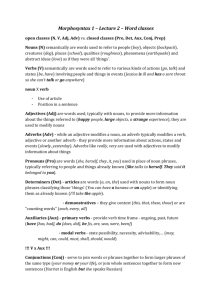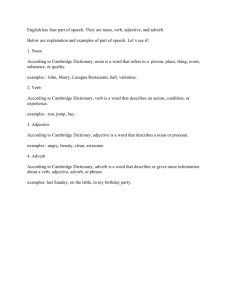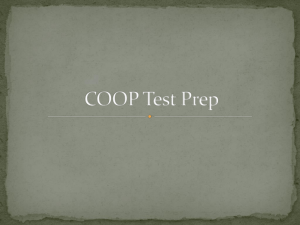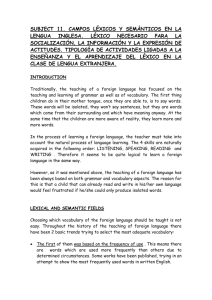EXAM REVIEW – ENGLISH IV POETRY DEVICES Epic Ballad
advertisement
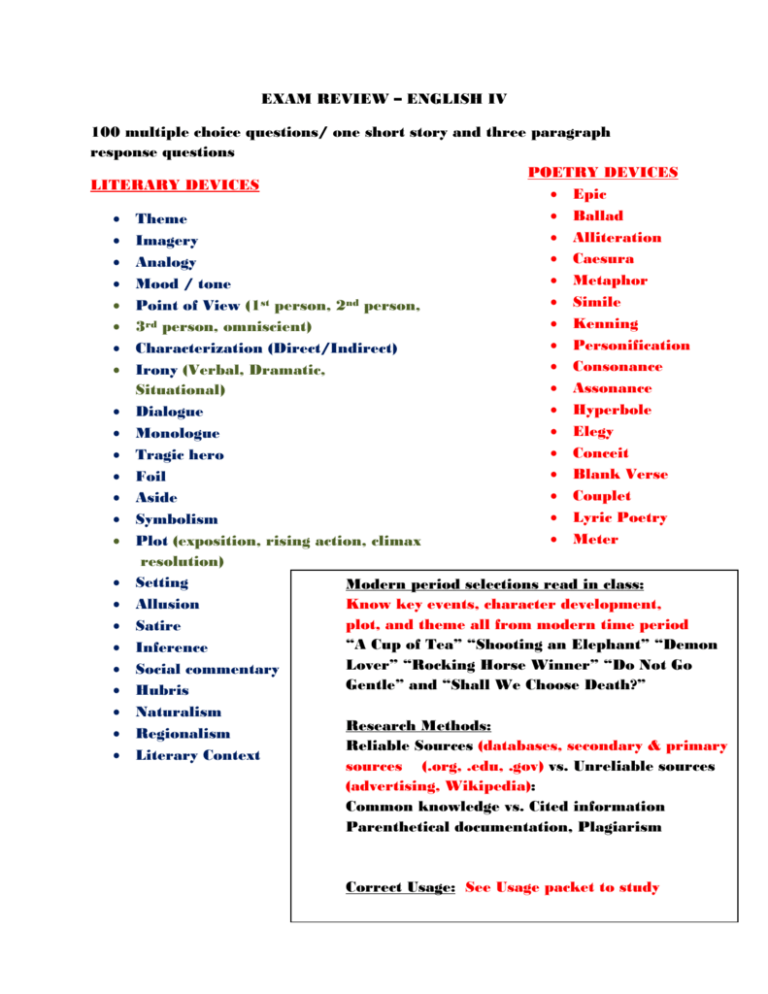
EXAM REVIEW – ENGLISH IV 100 multiple choice questions/ one short story and three paragraph response questions POETRY DEVICES LITERARY DEVICES Epic Ballad Theme Alliteration Imagery Caesura Analogy Metaphor Mood / tone Simile Point of View (1st person, 2nd person, Kenning 3rd person, omniscient) Personification Characterization (Direct/Indirect) Consonance Irony (Verbal, Dramatic, Assonance Situational) Hyperbole Dialogue Elegy Monologue Conceit Tragic hero Blank Verse Foil Couplet Aside Lyric Poetry Symbolism Meter Plot (exposition, rising action, climax resolution) Setting Modern period selections read in class: Allusion Know key events, character development, plot, and theme all from modern time period Satire “A Cup of Tea” “Shooting an Elephant” “Demon Inference Lover” “Rocking Horse Winner” “Do Not Go Social commentary Gentle” and “Shall We Choose Death?” Hubris Naturalism Regionalism Literary Context Research Methods: Reliable Sources (databases, secondary & primary sources (.org, .edu, .gov) vs. Unreliable sources (advertising, Wikipedia): Common knowledge vs. Cited information Parenthetical documentation, Plagiarism Correct Usage: See Usage packet to study Literary terms: On this sheet a lot should always be two words. I like my English class a lot. Alot is not a word A while is a noun Let’s think for a while. Accept is a verb meaning “to receive or agree.” I accept your explanation. Awhile is an adverb We’ll continue awhile with the lesson. Except can be a verb but is mostly used as a preposition meaning “but.” Footballs fly straight, except in high winds. Effect can be a noun meaning “result” or a noun meaning “to accomplish.” Lighting can have a good effect on plants. Already means “by this time.” Mike was already capable of reading. Affect is a verb meaning, “to influence.” Lighting can affect plants. All Ready means “completely ready.” She was all ready to perform. All right: this should always be 2 words Ice cream is all right with me! Alright is not a word. All together means “in a group.” We were all together for the last time. Altogether means “completely.” The picnic was an altogether great moment. Amount refers to nouns that cannot be counted. We had a vast amount of fog. Bad is an adjective describing a noun. The soup was bad. Beside means “at the side of.” My cat curled up beside me. Number refers to nouns that can be counted. We have a small number of books from class. Badly is an adverb telling how something is done. The soup was prepared badly. Besides means “in addition to.” There is more to life besides television. Between compares one thing to another Between you and me, I like pop music. Among shows relationships of three or more I was among all of my friends at the beach. Lend means “to give for temporary use.” Please lend me your pen. Loan is a noun. We got a loan from the bank. Could have, might have, should have: CORRECT USAGE! Farther refers to physical distance. We traveled farther today. Could of, might of, should of: INCORRECT USAGE! Further refers to degree or time. We will discuss this further at the next meeting. Fewer refers to nouns that can be counted. Fewer students enrolled this year. Less refers to nouns that cannot be counted. It takes less time to get a degree than usual. Good is an adjective. The soup is good and hot. Well is an adverb. The team played well. Hanged refers to death by hanging. People are hanged for crimes. Hung is usually a verb. Pictures were hung of people who were hanged. Lay means to put or place. Lay your cards on the table. Lie means to recline or be positioned. My dog likes to lie in the sunshine. Raise means “to cause to move upward.” Raise the flag at 7:30 this morning. Rise means “to go up.” Does the sun rise over the eastern or western horizon? Irregardless: This is not a word!






